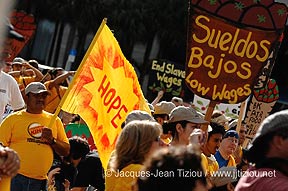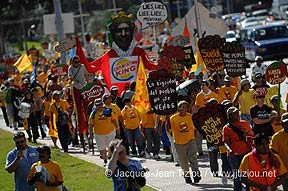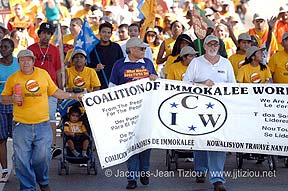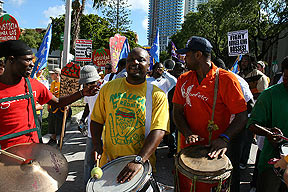Posts tagged Immokalee
Coalition of Immokalee Workers marches in Miami
Fellow workers:
Right now, the Coalition of Immokalee Workers are marching in the streets of Miami, as part of their campaign to win wage increases for tomato pickers whose tomatoes are bought by Burger King. Here’s why.
Today, farmworkers from Immokalee, Florida and their religious, labor, and student allies are marching 9 miles through the streets of Miami to the world headquarters of Burger King.
Today we march because there is a human rights crisis in the fields of Florida. Tomato pickers who harvest tomatoes for the fast-food industry face sweatshop conditions every day, including sub-poverty, stagnant wages (pickers earn about $10,000/year on average and a per-bucket piece rate that has not changed significantly since 1978) and the denial of basic labor rights.
Today we march because to earn minimum wage for a 10-hour day, a tomato picker in Florida must harvest over TWO AND A HALF TONS of tomatoes.
Today we are marching because, in the most extreme cases, farmworkers face conditions of modern-day slavery. We have seen five slavery operations in the fields brought to the federal courts since 1997, helping to liberate over 1,000 workers and sending 10 employers to prison.
Today we march because Burger King contributes directly to farmworkers' poverty through its high-volume purchasing practices, for decades demanding the cheapest tomatoes possible but never demanding fair treatment or just wages for the people who harvest those tomatoes.
Today we are marching because we have hope. In the past years farmworkers and consumers have united to bring Yum Brands (the world’s largest restaurant corporation) and McDonald’s to the table to help improve tomato pickers’ wages and working conditions.
Today we march because, in the wake of these changes, we stand on the threshold of a more modern, more humane agricultural industry in Florida. Yet, facing this historic opportunity, Burger King has responded with lies and excuses to not take responsibility.
Today we are marching to say ENOUGH.
Today we are marching for the dignity of workers, consumers, and our communities alike.
JOIN US as we demand justice. Rally at Burger King headquarters this afternoon, 3:30 to 6:00, at Blue Lagoon Drive and NW 57 Ave.
—Coalition of Immokalee Workers (2007-11-30): Why We March

Migrant farmworkers in southern Florida spend every workday picking tomatoes by hand for 10 to 12 hours at a stretch, at a piece rate of $0.40–$0.45 for every 32 pound bucket that they fill (or about 1¼ to 1½ pennies per pound of tomatoes picked). Since that piece rate hasn’t changed since 1978, farmworker’s real wages have actually fallen by more than two thirds over the past three decades, thanks to the combination of the farm bosses’ efforts to stonewall wage increases and the Federal Reserve’s efforts to keep the market safe for finance capital by eating up the value of other people’s wages.
The Coalition of Immokalee Workers, a farmworkers’ union founded in 1993 and organized along community workers’ council lines, has been working to change all that. They are mostly immigrants from Mexico, Central America, and the Caribbean; many of them have no legal immigration papers; they are pretty near all mestizo, Indian, or Black; they have to speak at least four different languages amongst themselves; they are often heavily in debt to coyotes or labor sharks for the cost of their travel to the U.S.; they get no benefits and no overtime; they have no fixed place of employment and get work from day to day only at the pleasure of the growers; they work at many different sites spread out anywhere from 10–100 miles from their homes; they often have to move to follow work over the course of the year; and they are extremely poor (most tomato pickers live on about $7,500–$10,000 per year, and spend months with little or no work when the harvesting season ends). But in the face of all that, and across lines of race, culture, nationality, and language, the C.I.W. have organized themselves anyway, through efforts that are nothing short of heroic, and they have done it as a wildcat union with no recognition from the federal labor bureaucracy and little outside help from the organized labor establishment. By using creative nonviolent tactics that would be completely illegal if they were subject to the bureaucratic discipline of the Taft-Hartley Act, the C.I.W. has won major victories on wages and conditions over the past two years. They have bypassed the approved channels of collective bargaining between select union reps and the boss, and gone up the supply chain to pressure the tomato buyers, because they realized that they can exercise a lot more leverage against highly visible corporations with brands to protect than they can in dealing with a cartel of government-subsidized vegetable growers that most people outside of southern Florida wouldn’t know from Adam.
The C.I.W.’s creative use of moral suasion and secondary boycott tactics have already won them agreements with Taco Bell (in 2005) and then McDonald’s (this past spring), which almost doubled the effective piece rate for tomatoes picked for these restaurants. They established a system for pass-through payments, under which participating restaurants agreed to pay a bonus of an additional penny per pound of tomatoes bought, which an independent accountant distributed to the pickers at the farm that the restaurant bought from. Each individual agreement makes a significant but relatively small increase in the worker’s effective wages — about $100 more per worker per year in the case of the Taco Bell agreement — but each victory won means a concrete increase in wages, and an easier road to getting the pass-through system adopted industry-wide, which would in the end nearly double tomato-pickers’ annual income.
Since the victory in the McDonald’s campaign, the C.I.W. have turned their attention from the Clown to the Crown, and Burger King Inc. has mostly followed the same path as Yum! Brands and McDonald’s did. First they ignored them. Then they stonewalled them. Then they tried to make up some excuses, and had a P.R. flack make an ill-considered little funny about how distressed farmworkers should apply for a job at their stores. (If I recall correctly, that same exact joke was recycled from Taco Bell.) Unfortunately, before moving on to the inevitable last step — in which they cave, the C.I.W. wins, the farm workers get a bonus, and the fast food chain gets to issue a press release patting themselves on the back for their humanitarian buying standards — Burger King has decided to make a detour through some dirty anti-labor joint maneuvers with the Florida tomato growers’ cartel.
The Florida Tomato Growers’ Exchange is a cartel and legislative lobby which represents more than 90% of Florida’s tomato growers. It has recently set out to destroy the pass-through system. Since the bonuses are paid by the buyers, the system costs the farm bosses nothing to implement, and I’m not entirely clear what their interest is here (although, if I had to guess, they are probably worried that widespread success for the system would raise workers’ expectations about pay and conditions). Burger King and the cartel recently teamed up on a joint P.R. campaign intended to convince the eating public that farm workers are actually richer than most minimum-wage workers, and besides which the farm bosses pay for charity houses and scholarships for their poor kids. (The basis for their argument is a comparison of estimated hourly wages. Of course, the reliability of those hours, or the total annual income, is never mentioned.)
Meanwhile, the F.T.G.E. and Burger King have endorsed the cartel’s yellow-dog auditing agency, S.A.F.E. Reps from Burger King and the tomato cartel have also teamed up with a Republican state congressman to discredit the C.I.W., by claiming that the set-up looks fishy, denouncing nonviolent protest and consumer boycotts as extortion,
and then insinuating that the pass-through system is little more than a channel for graft, and that C.I.W. is pocketing a skim. Since they have no empirical evidence for this claim, they have relied on innuendo and unsubstantiated soundbites, and they have refused to give any backing for their claims, while steadfastly ignoring the offers of participating restaurants, who dismiss the claim, to explain how the system works.
Meanwhile, Reggie Brown, the tomato cartel’s professional spokesdick, has invoked the spectre of federal prosecution, claiming that the C.I.W.’s voluntary pass-through system somehow violates federal antitrust and racketeering laws. Brown has also denounced the freely bargained agreements as un-American
, apparently because they organized bosses’ divine right to control the terms of wage negotiations with no input from workers organizations or, for that matter, their customers. The cartel has publicly warned its members not to participate, and, behind the scenes, they have apparently threatened any member who participates in the penny-per-pound pass-through system with a $100,000 fine. As a result, while Taco Bell and McDonald’s are still willing to participate in the bonus system, all of the growers have, as of now, announced that they will not participate next year.
Well, fine. If they want to play hardball, let them play hardball. Workers are more than capable of hitting that hardball right back. The main danger, at this point, is that, with spokesdick Brown’s muttered fulminations about federal prosecution and the bosses’ enlistment of state government creeps on their side, this fight may get kicked from creative, nonviolent industrial action, over into the stifling atmosphere of legal and regulatory action. As long as the C.I.W., and the workers and consumers acting in solidarity with them, keep away from political action, we have all the resources we need to beat them. The Taco Bell boycott was won, after years of stonewalling, through fight-to-win tactics like working with sympathetic students to get Taco Bell franchises booted out of campus dining halls. This fight can be won through more of the same, and better. Never forget that the workers are more powerful with their hands in their pockets than all the weapons and property that the plutocrats have to attack us. As Robin Blumner writes in the St. Petersburg Times:
The coalition initially tried to convince the growers to pay the added penny but they wouldn’t budge, so the group sought to enlist fast-food giants instead. Go to the major buyers who have reputations to uphold and have them pay the penny. It was a brilliant stroke.
Consumers tend to respond well to a company they think is socially responsible, and the converse is true.
… According to [C.I.W. rep Julia] Perkins, there are growers willing to help their workers secure this additional wage but the exchange is standing in the way.
Both Yum Brands and McDonald’s say they are committed to their agreement with the coalition. It appears that for now, however, things are on hold until the coalition and these companies can figure out a way around the intransigence of the exchange.
This is how it often is in labor fights: Employers dig in so hard that even an extra penny – one that they’re not even paying – is too much to ask. No wonder they can’t find Americans to do this work.
In the meantime, the coalition is trying to convince Burger King Corp. to come aboard, and is planning a demonstration at its headquarters in Miami on Friday. Keva Silversmith, a Burger King representative, says that the
Florida growers have a right to run their business how they see fit.I guess expending the $250,000 it would cost Burger King is simply too much for a company that is paying its CEO $2.35-million a year.
Okay consumers, sic ’em.
— Robin Blumner, St. Petersburg Times (2007-11-25): At a penny per pound, a little adds up to a lot
Further reading:
- Eric Scholosser, New York Times (2007-11-29): Penny Foolish
- C.I.W. Breaking News (2007-11-26): Amazing (Dis)Grace… Burger King, tomato growers’ strategy exposed: Industry giants team up to sabotage progress for farmworkers.
- GT 2007-04-19: ¡Sí se puede! The CIW wins a groundbreaking wages and conditions agreement with McDonald’s
- GT 2005-03-31: Anarquistas por La Causa
- GT 2005-03-23: El pueblo unido jamás será vencido!
- GT 2001-08-30: Si se puede
- GT 2004-05-01: Free the Unions (and all political prisoners)!
May Day 2007
We Have Fed You All for a Thousand Years
We have fed you all for a thousand years,
And you hail us still unfed,
Though there’s never a dollar of all your wealth
But marks the workers dead.
We have yielded our best to give you rest,
And you lie on crimson wool;
But if blood be the price of all your wealth
Good God we have paid in full.There is never a mine blown skyward now
But we’re buried alive for you;
There’s never a wreck drifts shoreward now
But we are its ghastly crew.
Go and reckon our dead by the forges red,
And the factories where we spin;
If blood be the price of your cursèd wealth
Good God we have paid it in.We have fed you all for a thousand years–
For that was our doom, you know,
From the days when you chained us in your fields
To the strike a week ago.
You have taken our lives, and our husbands and wives,
And called it your legal share;
But if blood be the price of your lawful wealth
Good God we bought it fair.–First printed by the Industrial Workers of the World in 1908. Words by
an anonymous proletarian,tune by Rudolph von Leibich
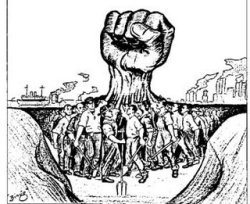
Fellow workers:
Today is May Day, or International Workers Day, a holiday created by Chicago workers–most of them anarchists–to honor the memory of the Haymarket martyrs and to celebrate the struggle of workers for freedom, a better life, and determination of the conditions of their own labor. It’s also the second annual day of strikes and marches for immigrant workers’ rights. May Day is and ought to be a day of resistance against the arrogance and power of the plutocrats. A day to celebrate workers’ struggles for dignity, and for freedom, through organizing in their own self-interest, through agitating and exhorting for solidarity, and through free acts of worker-led direct action to achieve their goals, marching under the banners of We are all leaders here
and Dump the bosses off your back
. A day to cheer immigrant workers struggling for their own freedom, in defiance of the attempts by La Migra and freelance nativist bullies to silence and intimidate them, marching under the banners We are not criminals,
and We are not going anywhere.
A day to remember:
There Is Power In A Union
There is power, there is power,
In a band of working folk,
When we stand
Hand in hand.–Joe Hill (1913)

In honor of the day, it’s a pleasure to recommend some reading from anti-state radicals–from a history of May Day’s American roots at The Agitator (Lauritz, not Balko), to Kevin Carson’s Organized Capital vs. Organized Labor, to Sheldon Richman’s column Labor’s Right to a Free Market. And I’d especially like to recommend Kevin’s simply brilliant earlier column, The Ethics of Labor Struggle: A Free Market Perspective. Kevin’s and Sheldon’s columns do an especially good job of showing the gulf between the managerial style of establishmentarian business unionism–so familiar to us in these the waning days of Babylon, with Wagner and Taft-Hartley carefully arranged to bring the established unions into the web of State privilege and State regulation–with the older, state-free tradition of wildcat unionism that May Day celebrates. Here’s Kevin Carson:
First of all, when the strike was chosen as a weapon, it relied more on the threat of imposing costs on the employer than on the forcible exclusion of scabs. You wouldn’t think it so hard for the Misoids to understand that the replacement of a major portion of the workforce, especially when the supply of replacement workers is limited by moral sympathy with the strike, might entail considerable transaction costs and disruption of production. The idiosyncratic knowledge of the existing workforce, the time and cost of bringing replacement workers to an equivalent level of productivity, and the damage short-term disruption of production may do to customer relations, together constitute a rent that invests the threat of walking out with a considerable deterrent value. And the cost and disruption is greatly intensified when the strike is backed by sympathy strikes at other stages of production. Wagner and Taft-Hartley greatly reduced the effectiveness of strikes at individual plants by transforming them into declared wars fought by Queensbury rules, and likewise reduced their effectiveness by prohibiting the coordination of actions across multiple plants or industries. Taft-Hartley’s cooling off periods, in addition, gave employers time to prepare ahead of time for such disruptions and greatly reduced the informational rents embodied in the training of the existing workforce. Were not such restrictions in place, today’s “just-in-time” economy would likely be far more vulnerable to such disruption than that of the 1930s.
More importantly, though, unionism was historically less about strikes or excluding non-union workers from the workplace than about what workers did inside the workplace to strengthen their bargaining power against the boss.
The Wagner Act, along with the rest of the corporate liberal legal regime, had as its central goal the redirection of labor resistance away from the successful asymmetric warfare model, toward a formalized, bureaucratic system centered on labor contracts enforced by the state and the union hierarchies.
…
It’s time to take up Sweeney’s half-hearted suggestion, not just as a throwaway line, but as a challenge to the bosses. We’ll gladly forego legal protections against punitive firing of union organizers, and federal certification of unions, if you’ll forego the court injunctions and cooling-off periods and arbitration. We’ll leave you free to fire organizers at will, to bring back the yellow dog contract, if you leave us free to engage in sympathy and boycott strikes all the way up and down the production chain, boycott retailers, and strike against the hauling of scab cargo, etc., effectively turning every strike into a general strike. We give up Wagner (such as it is), and you give up Taft-Hartley and the Railway Labor Relations Act. And then we’ll mop the floor with your ass.
— Kevin Carson, The Ethics of Labor Struggle: A Free Market Perspective
That’s just a sampling. You really must read the whole thing.
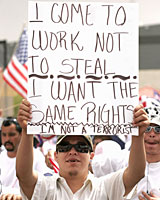
Meanwhile, in the news, some creep in Washington is wandering around proclaiming Loyalty Day
and demanding our renewed allegiance; and while the punch-drunk official unions are begging the government for more favors, the captains of industry are begging the government to keep a tight leash on free association. But the most significant events for labor and for human freedom are happening beyond the noise and spectacle of that gladiatorial arena, in the streets of cities all over the country where workers demand their rights in defiance of the so-called immigration law, and in unrecognized, grassroots unions organized along syndicalist lines, where workers have won concrete gains from the biggest corporations in their industry by operating through the use of creative secondary boycotts. There is a lesson here–a lesson for workers, for organizers, for agitators, and anti-statists. One we’d do well to remember when confronted by any of the bosses–whether corporate bosses or political, the labor fakirs and the authoritarian thugs styling themselves the vanguard of the working class, the regulators and the deporters and the patronizing friends of labor
all:
Dump the Bosses Off Your Back
Are you cold, forelorn, and hungry?
Are there lots of things you lack?
Is your life made up of misery?
Then dump the bosses off your back!–John Brill (1916)
Further reading:
¡Sà se puede! The CIW wins a groundbreaking wages and conditions agreement with McDonald’s
The Coalition of Immokalee Workers has scored another major victory in their ongoing campaign to improve wages and conditions for Florida tomato-pickers.
McDonald’s USA, the largest fast-food burger business in the nation, Monday reached agreement with a Florida farmworkers organization to pay about 75 percent more for the tomatoes it buys from state farms.
According to McDonald’s and the Coalition for Immokalee Workers, which waged a two-year campaign for the increase, laborers who now receive 40 to 45 cents for a 32-pound bucket of tomatoes will earn about 72 to 77 cents for that measure, a 1 cent per pound increase.
The company said the hike would not cause it to raise its prices at the counter.
The workers coalition said the agreement would affect between 1,000 to 1,500 workers who labor for several Florida tomato growers. It is the second major victory for the farmworkers – similar to a pact reached in 2005 with Yum! Brands, the owner of Taco Bell and other fast food chains. That agreement, according to the coalition, affected about 1,000 workers
This is a very good day for us,Julia Perkins, a spokeswoman for the coalition, said Monday.What it represents is a glimmer of hope that things can change across the country, with Burger King, Wal-Mart and Subway too.Those chains also are large buyers of tomatoes, and the coalition is pressing them to raise payments to tomato pickers. The farmworker organization announced that the next company it will target for higher wages for pickers is the arch rival of McDonald’s, Miami-based Burger King.
Lucas Benitez, leader of the farmworkers coalition, was participating in a protest caravan heading for the corporate headquarters of McDonald’s in Oak Brook, Ill., near Chicago, to stage demonstrations when the agreement was reached. He said he would continue the caravan.
When we get up there to Chicago we will announce the good news of the agreement with McDonald’s,he said.…
Farmworkers are some of the lowest paid workers in the country. According to Perkins, before the Taco Bell agreement, wages for tomato pickers had hardly moved in 25 years.
Taco Bell, which resisted the coalition demands for about four years, was the object of a nationwide boycott until it reached its agreement. During the boycott, several universities ordered Taco Bell franchises on their campuses to close their doors.
No boycott had been called yet against McDonald’s. Perkins said the campaign had included some picketing outside McDonald’s franchises, a letter-writing effort and meetings on university campuses and at churches. But she made it clear that the campaign had been heading toward a possible boycott.
Yes, it was looking like the campaign was going to get more aggressive,she said.Perkins said the details of the agreement had not been completed, but she expected it to work much like the Taco Bell pact. She said that Taco Bell pays the extra penny per pound directly to the workers, who receive a separate, second check —
a bonus check— for those Taco Bell tomatoes.She said the increase did not represent a 75 percent increase in total wages for pickers because many of the tomatoes they pick are destined for other buyers who have not agreed to the increase.
But it can make a difference of 15, 30 or even 100 dollars per week for some workers depending on how many of the tomatoes are heading for McDonald’s,she said.Benitez said the McDonald’s pact, like the Taco Bell agreement, will ensure that all workers picking McDonald’s tomatoes also will have their human rights and civil rights respected and that a system for protesting workplace violations will be instituted between the coalition and McDonald’s.
…
Benitez identified three growers the pact would affect: Six L’s of Immokalee and Pacific Tomato and Taylor & Fulton, both of Palmetto.
The CIW isn’t done yet. Taco Bell held out for four years of a long and bitter struggle; the CIW won with McDonald’s after two years of low-intensity pressure that was about to be stepped up into a major campaign. They have already begun to organize their next campaign — to bring Burger King into a similar agreement — and every victory that they win will make the next one faster and easier than the last.
While establishmentarian unions in the AFL-CIO and Change to Win
[sic] are fighting (punch-drunk) for their very survival, and begging the political class for yet more government protections, the CIW has won agreements with two of the biggest corporations in their industry — first Yum Brands (owners of Taco Bell) and now McDonald’s — with no government privileges to wield and with members speaking several different languages, organizing across barriers of culture and nationality, amongst workers who are constantly moving and who are amongst the poorest and most exploited workers in the United States. But they’ve won precisely because they aren’t restrained by the smothering patronage of government-approved labor relations: without government recognition, there are no government strings attached, and that has allowed the CIW to make use of fight-to-win tactics — such as secondary boycotts — that are simply illegal for NLRB-recognized unions to use. This win is, in other words, another inspiring example of the real power of wildcat unionism and creative extremism.
Fellow workers, you have both my congratulations and my thanks. Yes, we can do it–ourselves. And we will.
Further reading:
Rad Money w/ John Brill
One of Mikhaela Reid’s latest cartoons, besides being grimly funny, makes an excellent point about the financial-advice industry: it offers sensible advice for people who have the time, money, security, and leisure to take advantage of it, but nothing beyond moralistic hectoring for those who don’t. (Not that this is the fault of, say, Suze Orman; it’s the fault of the way that comfortable members of the middle and upper classes use the ideas they get from the financial advice industry as another way to bully people who make less than they do.) As Mikhaela glosses it on her website,
I am of course, referencing financial-advice programs like the Suze Orman Show and CNBC’s Mad Money w/ Jim Cramer (a popular show described by Businessweek as
Louis Rukeyser meets televangelism meets Pee-wee’s Playhouse). Not that Suze Orman doesn’t have sound financial advice, because she does–budget, save, invest, take realistic vacations, etc. (Jim Cramer, on the other hand, just strikes me as off his rocker, telling people to invest in crazy random stocks, but hey, what do I know?)All of that is all very well for middle-class people (although maybe not as well as it could be when you think about college tuition and other skyrocketing costs). But there’s only so much people can do personally when they’re in really, truly horrible money situations and the social safety net has been pulled out from under them (see How Tax Cuts for the Rich Can Help You!).
With cuts to federal student aid, health-care programs, child-care programs, retirement programs, etc., the burden falls more and more on individuals. We hear more and more about individual responsibility to save for health-care, for retirement, for college. But you know what? When you make barely enough to feed your family, that’s a goddamned cruel joke. Expecting people who can hardly pay their rent in the moment to put away for the future is just bizarre. The math just doesn’t add up. There’s only so far you can squeeze a penny.
And these same jerks in the Bush Administration and Congress who are cutting the social safety net (didn’t they learn ANYTHING about poverty from the aftermath of Hurricane Katrina?) are happy to spend billions on the Pentagon, which then uses the money that could have gone to education and sound investments in the future of our country to bomb the crap out of innocent civilians in Iraq.
— Mikhaela’s News Blog (2006-01-15): New Cartoon: $AD MONEY! w/ Susie Poorman!
All of that’s true, of course. And well taken. But of course it leaves open the question: now what do we do about it?
One option that’s always available is to despair and do nothing. This seems, in fact, to be one of the most popular plans among professional-class Progressives
who don’t actually need to worry about these issues in their everyday lives. Actually, that’s not a bad plan for them to follow; I’d be quite happy if all the Progressives
out there kept doing nothing, given what happened the last time Progressives
got enthusiastic and active. But not everyone has that luxury, so let’s move on.
Another option is that you could get back into the lists and fight to recover the alleged government protections that have been lost: more social welfare programs, more regulations demanding that bosses give such-and-such benefits or such-and-such a wage to workers, repeal of free trade agreements, nationalized medicine, or whatever your bag is. But besides having any number of moral and economic objections to these ideas, I also just think that this is unworkable advice for people who don’t have the money, time, security, or leisure to get involved in politics. If the kind of advice that Suzy Orman has to offer isn’t going to get you very far in personal finance when you’re living on the minimum wage, it’s not going to get you very far in politics either, because politicians respond to political pull, and rich people have more resources for buying political pull than you do. The welfare
programs that you do get out of a strategy like this typically amount to little more than the bait on the steel trap of social control (government schooling, to take one obvious example; the government-sponsored dead-end employment agency known as TANF
to take another). And what politicians give, they can easily take away, as recent experience shows. The labor regulations that you get, when you get anything at all, are no less easily taken away, and also usually amount to yet another silver cord to bind workers to the bosses. (These days a lot is made of the fact that boss-provided medical coverage and pensions are in a state of crisis. That’s true. It might help demonstrate why the tax and regulatory structure that encouraged workers to depend on the bosses for their pensions and medical insurance was a bad idea to begin with.)
So, fellow workers, here’s my financial planning advice for you. Planning, investing, and saving is as important for folks working at or near the minimum wage as it is for the comfortable and the wealthy, but a different situation means different strategies. My suggestion is that you invest in membership dues for a fighting union, plan on firing your boss, and save yourself from depending on the milder sentiments of corporate or government bureaucrats for your money, your raise, your benefits, or your retirement. Let’s call it the John Brill Working-Class Rad Money Plan.
Like any other financial planning advice program, this one needs some Real Life Success Stories. Need a raise? Immokalee farm-workers joined a fighting union, and that’s what it got them. Need more money and a better benefits package? New York transit workers joined a fighting union, and that’s what they got.
But that’s not all, either. Here’s a couple of new stories. Neal Rysdahl joined a fighting union, and here’s what it did for him:
On January 14, 2005, members of the Chicago General Membership Branch of the Industrial Workers of the World labor union (IWW) called for an informational picket to boycott the Ideal Hand Car Wash in Chicago’s Albany Park neighborhood after the managers and owners of the business refused to pay Neal Rysdahl, a longtime member of the IWW, the $227.50 he was owed for over 45 hours of work he preformed for them.
The highly visible protest began at 8 AM, with a small but dedicated group of picketers banging bucket drums, shaking noisemakers, passing out leaflets, and carrying signs reading,
Ideal Car Wash Cheats Workers,andAn Injury to One is an Injury to All!Notably, one picketer dressed in a clown costume held a sign reading,Ideal Bosses Are Bozos!to mock the clown Ideal usually uses to attract customers.Humboldt Park Food Not Bombs showed up to serve bread, pastry, hummus, and coffee, and joined in the picket.
I knew this was an important picket to support because it was an opportunity to make a real difference in someone’s life through direct action,said Robert Clack, a member of Humboldt Park Food Not Bombs.The picket effectively shut down business at the car wash for the morning, as most drivers who intended to patronize Ideal drove away after talking with picketers or seeing signs blasting the business for unfair labor practices.
After only three hours of picketing, Eduardo
EddieAmanero, a manager of the car wash, agreed to pay Rysdahl in full, in cash, on the spot, in order to bring an end to the picket.
The point of all this is, if you mess with one of us, you mess with all of us,said Patrick Brenner, a members of the National Executive Board of the IWW.We stick up for our members.… When asked what he was going to do with his back wages, Rysdahl said,
I’m going to catch up on some debts. And, of course, I’m going to pay all of the back dues I owe to the IWW!
And it’s important to remember that the success of the Brill Plan doesn’t depend on filling out the right set of forms. Of course a formalized union structure can help, but it isn’t necessary. The Brill Plan works from the bottom up; it begins when you get to know your fellow workers and agree to stand by each other. With no formal union and no government recognition, Wal-Mart employees in Florida still made a fighting union of their own, and here’s what it did for them:
In central Florida, Wal-Mart workers are fighting and sometimes winning campaigns using collective action to solve both shop floor and larger industry-wide problems.
In one rural Florida town, over 20 percent of workers in the local Wal-Mart had their hours cut. In response, workers went into their community with a petition to reinstate the workers’ lost hours, and collected 390 signatures in three days. Their hours were returned.
In South St. Petersburg, a popular third-shift employee was accused of theft and fired. The next day, half the day shift quit in protest. In another store, 20 workers marched on management after a 70-year-old workplace leader had her schedule changed. Her schedule was returned within days.
Several workers rode their bikes to work even though Wal-Mart didn’t provide a bike rack. With some co-workers, they demanded management buy a bike rack. When management refused, they bought a rack with their own money and demanded that management install it. Management gave in, and donated the cost of the rack to a local charity.
These actions were initiated and led by members of the Wal-Mart Workers Association (WWA), a growing group of 300 current and former Wal-Mart workers in over 40 stores.
This is a protest movement of Wal-Mart workers uniting to make their lives better at work and in their communities,said Rick Smith, WWA organizer and Florida director of the Wal-Mart Association for Reform Now (WARN), a coalition of labor, community, homeowner, and anti-poverty groups.It’s about Wal-Mart workers sticking together, honoring their work, arranging carpools, and providing child care for each other.Non-majority unions such as the WWA don’t wait for a court to license workers’ use of collective action. They harness that anger and ingenuity to both win day-to-day victories and launch longer-term pressure campaigns. The strategy has roots in industries in which union recognition is rare: retail chain workers, state workers, and computer programmers and manufacturers.
We have the right to organization, regardless of what the boss or the state do,said Smith.
There’s only so far you can squeeze a penny, but a fighting union means more dollars to squeeze or spend as you see fit. The Brill Plan works. When workers stand together, workers win. So if you’re working for a living and barely scraping by, the best financial advice that I can offer is: stop being sad and start getting rad.
